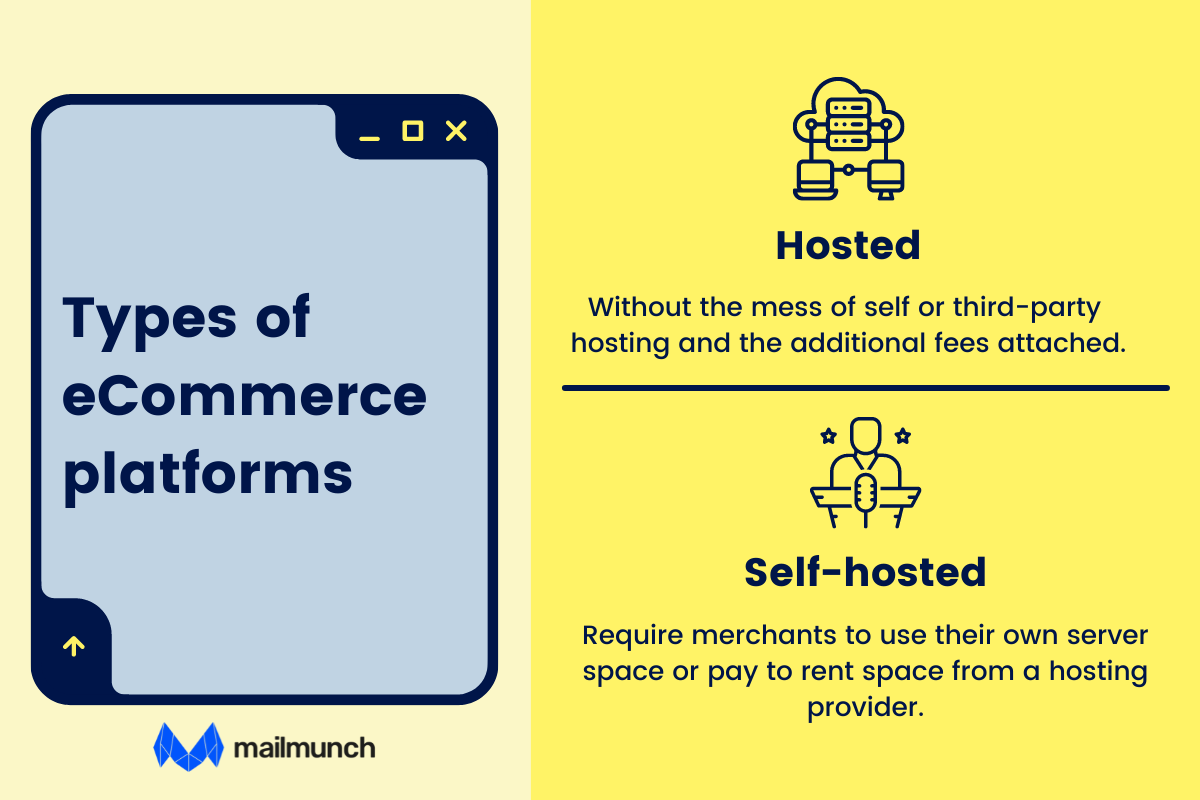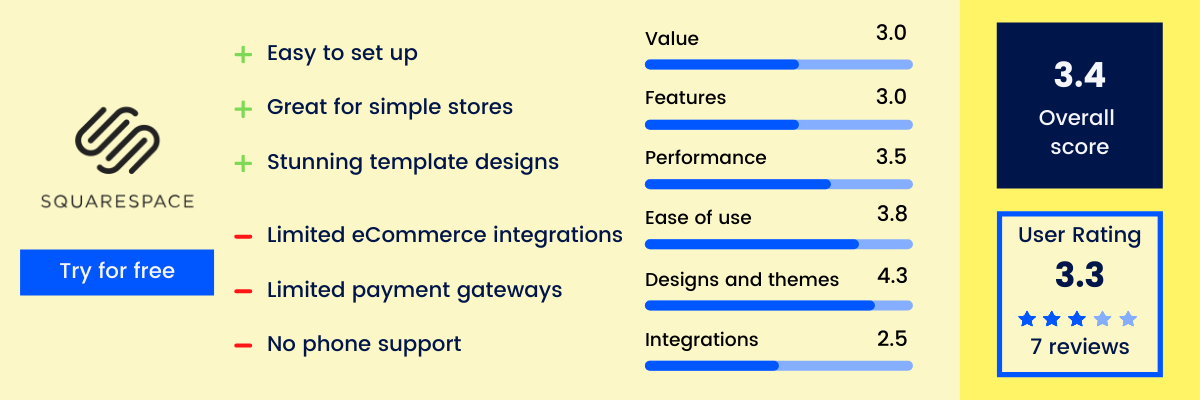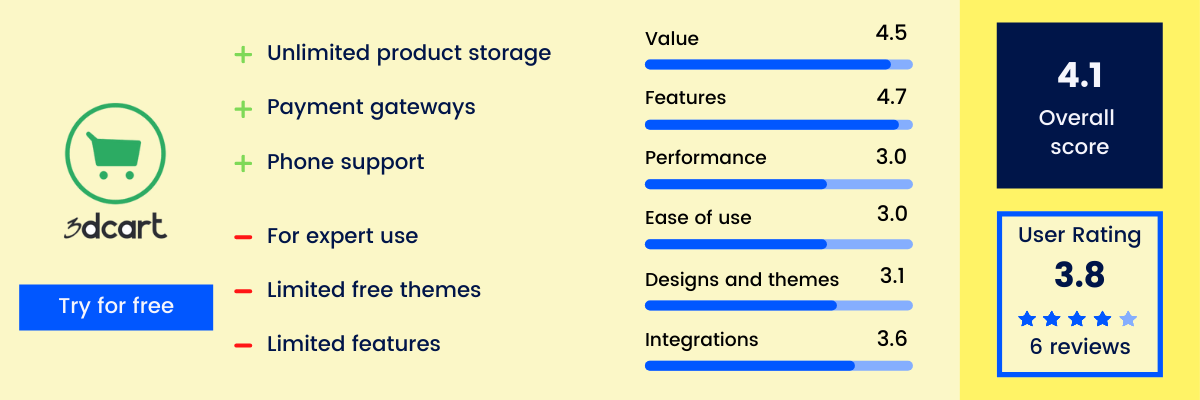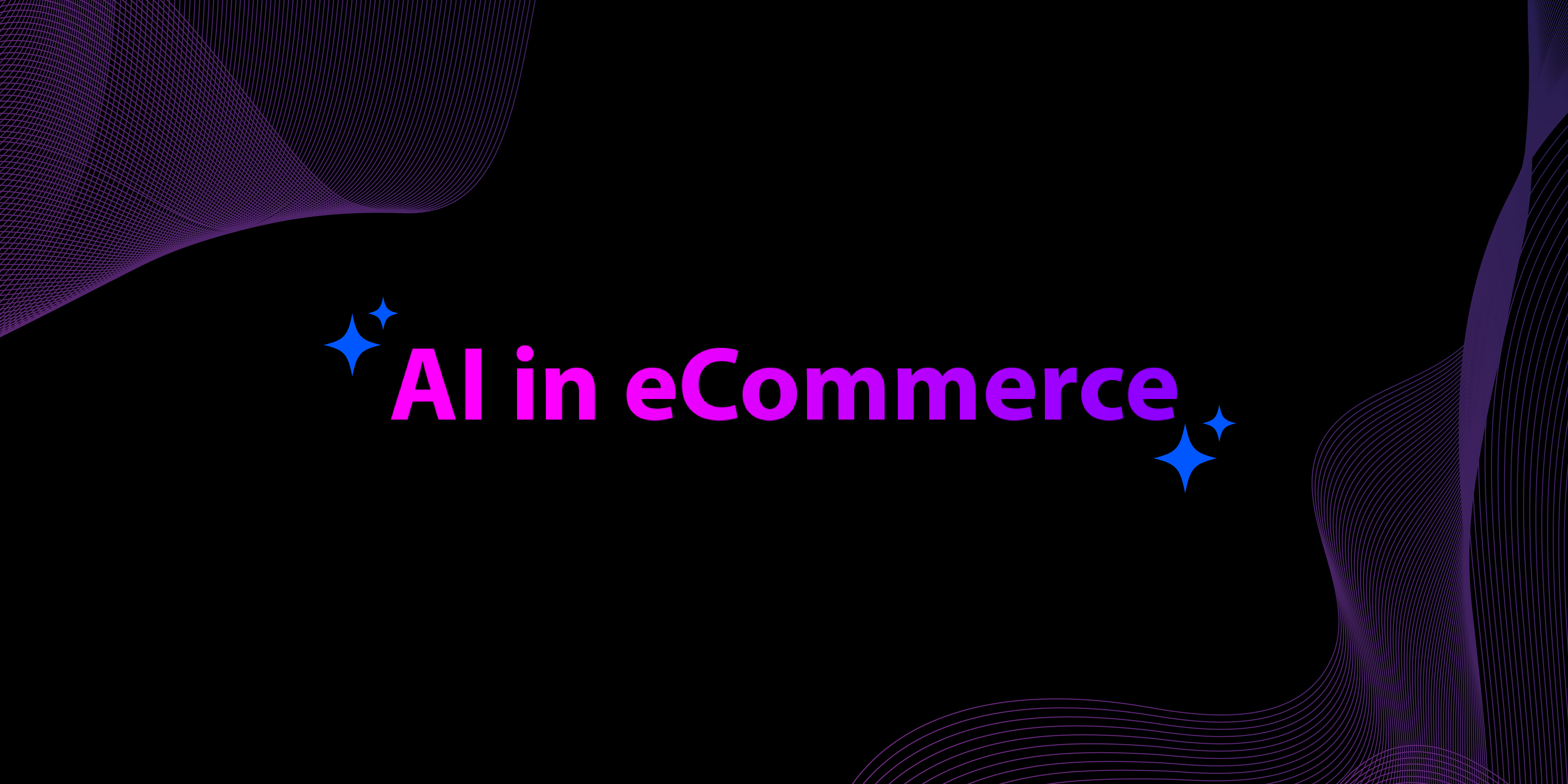

Last updated on
March 27, 2024
The current pandemic has resulted in a massive increase in online shopping worldwide. In the foreseeable future, the eCommerce industry shows no signs of slowing down in the foreseeable future. According to Statista, by 2022, the global eCommerce market is expected to reach $6.54 trillion in sales. That’s up from $3.53 trillion in 2019.
Whether you are looking to start a new eCommerce business from scratch or searching for ways to expand your existing business in the online world, you need an eCommerce platform to achieve your goals.
When searching for a comprehensive eCommerce platform, you need to remember that not all of them are created equally. Various platforms include all-in-one website builders, email service providers, shopping cart software, and some plug-ins or add-ons.
So how do you determine the best eCommerce platform for your business? That depends on your unique business needs and requirements. I have compiled a list of some of the best eCommerce platforms for you and your business.
Before diving into the eCommerce business, become familiar with it. eCommerce business is the buying and selling of products and services online. Anyone from freelancers or small to large businesses can benefit from selling their products and services online.
Common eCommerce examples include retail, drop shipping, digital products, wholesale, services, subscription, crowdfunding, etc.
An eCommerce is all about facilitating website management, marketing sales, operations for an online business (eCommerce store). Remember 4 elements of a good secure eCommerce website.
At the end, whichever eCommerce software you choose should empower your online business seamlessly.
Before making your eCommerce website available to the public, you need a managed hosting service like a shared web hosting, VPS, dedicated hosting, cloud hosting, etc..
Why?
The hosting records all the information about your eCommerce sites, allowing internet users to view the website content. Every website has a hosting server. It's dedicated server space. eCommerce businesses can opt for two types of hosting.

Some website builder has a hosted platform. It means no fuss, no muss of interacting with a third-party hosting, and without any additional fees! Shopify store is a great example of hosted platforms. Such platforms are user-friendly, and you can use optimized eCommerce website design to help improve the user experience.
An eCommerce business using their own server space or paying a fee for the rented space from a hosting provider are self-hosted. Does it make website management more complicated? Yes. The owner is responsible for ensuring all updates, maintenance, fixing bugs and errors.
Third-party hosts the website data and charges you a fee for the services. The costs can add up quickly with updates. Sometimes it can leave hanging and dry at crucial times like boosting website traffic during sales.
Any eCommerce business can work in four types of eCommerce.

It refers to business-to-consumer selling. Sometimes, it is also referred to as DTC (direct-to-consumer) sales funnel.
It refers to the business-to-business sales funnel. The transactions involve wholesale buying and selling from one business to another, like office supplies or inventory. In such a case, using email marketing services is a proven tactic to improve sales.
These transactions are from consumer to business. For instance, consumer influences another consumer to buy a product or service on a featured social post on behalf of a business. It can be done in exchange for money, coupons, or five-star reviews.
Even a consumer can sell to another consumer. Facebook Marketplace and eBay are common examples of online platforms to facilitate this type of transaction.
Therefore, eCommerce will help small business owners decide the type of online store they want to run.

Shopify, BigCommerce, and Squarespace have one thing in common - they use pre-made templates for their store. Instead of getting stuck with a traditional retail store, use custom-built website templates to help run your store in just a few clicks.
You do not require deep technical knowledge to start working on an eCommerce site. With marketplaces like Amazon and eBay, you just need to create an account, and you are good to go.
Choose eCommerce solutions to set up your site and drive traffic quickly.
eCommerce businesses have low startup costs. Sometimes as low as $20. Marketplaces do not cost a dime either; they are free to sign-up. But they take a small percentage of the earnings.
However, once you start selling items, do it slowly. Avoid large upfront investments for a safe way to start running your online store. As your online sales grow stronger, you can build your site parallel to those sales.
The use of digital marketing channels is pretty common these days. 87% of the shoppers use digital channels to find the best-sold brands before buying a product.
Even if they visit a physical store, first they search about it online for multiple reasons like comparing prices, brands, customer reviews, and more. To only way to build confidence in online shoppers is to set the foundation for your online presence. Use free themes to create a stunning website. Online selling is more efficient for online stores when their target audience can find the relevant information they are looking for.
Online selling has one advantage - it's easier to collect and measure customer data. Email marketing tools fasten the process to keep the user experience hyper-personalized to generate customer data.
To reach better prospects, first-hand data is collected from Google Analytics and built-in marketing tools to track consumer behavior. Collect the data ethically to maintain the privacy laws and identify the customer insights.
An eCommerce site consists of product descriptions, product comparisons, and user reviews. The key to a successful content marketing strategy is to cover all the information that convinces the website visitor to convert into a customer.
To have a competitive advantage over your competitors, create landing pages on using your products. Blog posts, videos, service pages are the most common practices to increase sales online.
There’s a lot of ground to cover when it comes to eCommerce. In your excitement to start an online store, it's easy to be distracted by multiple niches. It's easier to focus on one or a few niches with a physical store. However, in an eCommerce store, you can cover multiple niches under one roof and sell to a larger group of customers.
Before you can market your products and services, choosing the eCommerce platform is essential to convey the desired message to the target audience. Therefore to make the best choice, you can use the MoSCow method to ensure your eCommerce business has the right marketing tool.

Ecommerce business capital investment is minimal. But the cost of the best eCommerce platforms varies based on several factors. When choosing the eCommerce platform, keep the cost of the app in mind; however, it should not be the only focal point.
According to Shopify, about $40,000 is the minimum amount a small business owner spends in their first year, while only 9% of that amount is utilized for online marketing tools.
Depending on the features you are looking for, an eCommerce platform can cost you as low as $10 or as much as $15,000! Identify your eCommerce business needs first, then define your budget. Compare the pricing plans and identify the one that meets the most business value.
It is hard to decide which eCommerce platform is most suitable for your online store without using a trial.
Most eCommerce software offers a free trial. Contact the sales agent to discuss or schedule a call to have in-depth discussion about what to expect from a free trial. It's in your favor to test the software before opting for a pricing plan.
Another key factor to look into is the type of integrations and plugins offered by the software. Remember, not all platforms offer the same level of integration. So you should have a clear scope and understanding of your online store.
Some of the most commonly popular plugins include accounting, email marketing, payment and shopping, customer loyalty programs, etc.
Is your online store user-friendly? If not, it’s about time you pay close attention to improving the website layout. The professional eCommerce website builder comes with free themes with a free account. There are paid landing page templates, too but only accessible to premium users.
Therefore investing in an eCommerce software is worth your penny if it offers free themes so that you can turn your website visitors into loyal customers.
eCommerce business grows with strategic planning and additional support of the eCommerce tools. Ensure the tool you platform you choose offers API integrations for store customization. Plus, it also should provide automation features for email campaigns.
At the initial stage, a business owner may skip this factor when considering the options, but once your profits pour in, you will soon need a tool that offers customization.
Are you looking to become a profitable eCommerce business? Then invest your money in any of the eCommerce platforms below.
Overall rating: 4.2
Price: Basic pricing starts from $29.99/month
Free trial: 14 days
POS: Yes

Shopify is one of the most famous and well-known eCommerce platforms for businesses. You can find almost everything for your online business there - themes, quick customizations, simple product management, payment processing, order monitoring, shopping cart software, etc. All of these features are incorporated into the design of Shopify, and you get high security for your online store.
Shopify is easy to use right out of the box regardless of your technical knowledge. In addition to your eCommerce store, Shopify supports third-party marketplaces, social media selling, and in-person sales with Shopify POS (Point of Sale) software.
All their themes are optimized for mobile devices. Shopify is a great fit for all kinds of businesses - from startups and small businesses to large corporations and enterprises.
Shopify also offers its services for enterprise clients - Shopify Plus. It costs more because of its most fantastic premium features, including advanced functionality, improved customer support, flexibility, and better customization on the code level. Shopify’s interface is a bit more friendly compared to other eCommerce platforms.
Overall rating: 4.3
Price: Basic pricing plan starts from #29.95/month
Free trial: 15 Days
POS: Yes

BigCommerce is a massive name in the eCommerce market and is used by businesses in 120+ countries worldwide. BigCommerce is another all-in-one eCommerce platform provider and offers everything for your online store.
BigCommerce comes pre-loaded with the most native features. They provide you with tools for SEO, conversions, and inventory management. They also offer 24/7 customer support via phone, email, and live chat.
BigCommerce also supports B2B wholesale websites and has solutions for enterprise-level eCommerce stores. This platform is second to none regarding features like uptime, page loading speed, and security. BigCommerce offers a bit more design customization possibilities than Shopify.
Overall rating: 3.4
Price: Basic pricing starts from $23/month
Free trial: No
POS: Yes (Third-party extensions)

One of the simplest and most intuitive website builders, Wix allows you to build a new website from scratch without any technical knowledge or coding experience required. Their intuitive drag and drop builder lets you design a high-quality website with text, images, videos, and other media types in minutes. You can add new pages or start a blog with Wix just as quickly.
With about 500+ templates to choose from, you can customize your online store easily. Wix will automatically optimize your website for SEO and mobile devices. If your website is built in Wix, you can also access the Wix App Market.
The market provides you with powerful web apps to customize your site. Wix has a larger number of customizable templates as compared to Shopify or Magento.
You also get a fully customizable storefront and shopping cart. Wix adds features like related products galleries, a quick add-to-cart button, mini-carts, shopping wishlist to your website. Wix also allows you to set up your own shipping rules to control international shipping orders better.
Overall rating: 4.8
Price: Basic pricing plan starts from $30
Free trial: N/A (But offers a 30-day money-back guarantee)
POS: Yes (Native)

WooCommerce is an open-source customizable platform for entrepreneurs. Unlike other platforms on this list, WooCommerce is built on WordPress, and you can use it through your WordPress site. You can convert it into an eCommerce store through the WooCommerce plugin if you already have a WordPress website.
WooCommerce provides you everything you need to add eCommerce capabilities to WordPress, including product catalogs, subscriptions, and memberships. The tool is fully customizable and has extensions for printing shipping labels and integrating with your email marketing platform.
To create a usable WooCommerce website, you will require extensions with payment gateways like Stripe, PayPal, Square, Amazon Pay, and Authorize.net.
If you already have an existing WordPress site, WooCommerce is one of the best options for you. Simply install the plugin and start customizing your online store. Unlike other platforms, WooCommerce provides customer management only via third-party plugins. They also have zero customer support.
Overall rating: 3.4
Price: Custom pricing plan
Free trial: No
POS: Yes (Third-party integrations available)

Magento is an all-in-one eCommerce solution offered by Adobe that processes more than $100 billion in gross merchandise sales every year.
Magento allows you to create an eCommerce store regardless of the size of your website. They support small businesses, mid-market and enterprises, and B2B online sales.
Magento stands out because of its efficiency, automation, and access to crucial information. Features like business intelligence, inventory management, shipping solutions, and order management make Magento a unique eCommerce solution. It also gives you amazing features for customer segmentation and personalization.
Your online store in Magento will automatically display product information, content, promotions, and prices based on customers’ data like location, order history, gender, wish list items. Unlike Shopify, Wix, and others, Magento doesn’t offer any themes of their own, so you just get the main software and have to rely on third parties for designs. But there are many other magento utilities that you can usse like store locator, mobile login, search extension and custom checkout fields.
You will have to contact the Magento sales reps for a custom quote on their Magento Commerce license. They also allow you a free demo to try their platform before you commit. You can also get Magento hosting.
Overall rating: 3.4
Price: Basic pricing starts from $18
Free trial: 14 days / one-time 7-day trial extension
POS: Yes (via mobile)

Squarespace is another popular eCommerce platform. Unlike some other platforms, Squarespace has built-in eCommerce capabilities for all of its business plans.
Squarespace is more popular for businesses and people in the creative industries. Their designs are considered modern and captivating, and their award-winning templates are perfect for artists, musicians, photographers, and fashion designers.
Squarespace allows you to showcase your work and sell it online. You can also use the platform to sell subscriptions and digital content. Squarespace offers automatic inventory management, impressive product display, and shipping calculator tools for physical products. You can also showcase your product videos.
They offer several integrations with other popular online selling tools like Apple Pay, PayPal, USPS, FedEx, and Stripe. Unlike Shopify and Wix, Squarespace doesn't offer customer support through telephone.
Overall rating: 4.2
Price: Forever free plan
Free trial: N/A
POS: Yes

Ecwid - a free commerce extension compatible with WordPress and other popular CMS platforms, allows you to sell online from marketplaces like Amazon, eBay, and even social media via Facebook and Instagram.
Unlike 3DCart, Ecwid doesn’t require any coding or developing experience to be installed. The Ecwid software integrated well with your in-person selling at your brick-and-mortar retail stores. If you have a WordPress website and don’t want to use WooCommerce as an eCommerce platform, Ecwid is a fantastic alternative.
Ecwid offers a free forever plan but with minimal functionalities. You will only be able to sell up to ten products without access to any sales channels outside your website.
The basic features offered are plug-ins for websites, product page categories, listings up to 10 products, mobile-responsive design alongside email support.
Overall rating: 4.2
Price: Free
Free trial: N/A
POS: Yes

Weebly is your simple eCommerce website builder originally owned by Square - a company specializing in payment processing and financial services.
For online stores, Weebly is a great option as it does not require a heavy setup. No technical expertise is required to operate this eCommerce platform either, which makes it user-friendly too.
Small businesses can build their first-ever online store using Weebly without any added cost. The basic pricing plan is free! So the budget is not an issue at all. However, users are unable to use their custom domain name and also cannot get rid of the in-app ads either unless they buy a paid plan.
Users can use 15 free themes for their eCommerce site, and other types of sites too such as blogs, portfolios, and events. The availability of an intuitive drag and drop builder makes it an easier option as compared to other platforms for first-time online users.
With Weebly, your store can be integrated with Square, Stripe, and PayPal inducing a transaction fee each time a payment is processed.
Weebly offers a theme, eCommerce upgrades, app integrations for email marketing and inbound marketing purposes, and social media integrations as well.
Overall rating: 4.1
Price: Basic pricing starts from $19
Free trial: 15 days
POS: Yes

3dCart - one of the oldest eCommerce platforms, was founded in 1997. 25,000+ merchants use 3dCart to power their eCommerce website.
A huge difference between 3DCart and other eCommerce platforms is that 3DCart is pretty advanced and is not for everyone. The platform doesn’t offer a drag and drop builder like Wix. To utilize the platform, you will need to know about coding and web development services to customize your templates and themes properly.
To turn your existing website into an eCommerce shop, you can install 3DCart into it. If you are unaware of how to edit your site’s code, you will need to hire a developer to do this.
Once installed, 3DCart provides you with more than 200 built-in eCommerce features. With 50 themes and 100+ payment processing options, 3DCart is a fantastic albeit a little complex tool. 3dCart has a better blog feature than other SaaS eCommerce and supports all the integrations you would need.
Overall rating: 4.6
Price: Pricing starts from $99/yearly
Free trial: No
POS: Yes

Easy Digital Downloads (EDD) is an eCommerce tool designed for selling digital products. Like WooCommerce, it’s a WordPress plug-in and downloaded by more than 2.5 million users.
EDD makes it easy for you to create discount codes, track download activity and restrict file access. Coming with a fully integrated shopping cart, it allows customers to purchase multiple downloads simultaneously. Easy Digital Downloads don’t limit how many digital products you can sell.
Integrating with popular tools and extensions like PayPal, Amazon Web Services, Zapier, Slack, Stripe, and others, EDD allows you easy functionalities for your eCommerce store.
Overall rating: 4.2
Price: Start for free
Free trial: https://www.opencart.com/index.php?route=common/home
POS: Yes

OpenCart is not a website builder, unlike other platforms listed above. It is a free and open-source platform that adds eCommerce functionality to existing websites. More than 342,000 websites currently use OpenCart for selling their products online.
The essential feature of this platform is the OpenCart marketplace. It gives you access to 13,000+ modules and themes and allows you to integrate with a comprehensive list of payment gateways and shipping providers.
OpenCart has a massive community support forum with more than 550,000 posts from 110,000+ registered members. You can also access their support staff by paying a one-time fee or an ongoing monthly subscription.
OpenCart is free to download and install, but the extensions and integrations will cost extra.
Overall rating: 4.5
Price: Basic pricing plan starts from $3.45/month
Free trial: N/A
POS: Yes

Bluehost offers web hosting for over 2 million websites, simplifying the process to set up a website. As a web host, it offers easy setups for beginners, free domains, a free SSL certificate, free CDN, and an intuitive drag and drop builder.
For beginners, it's an all-in-one solution that comes with resource protection. If you are using the basic plan, users can pay an additional $2.99/month for a backup.
However one may find the hosting plans a lot less complicated as compared to other options. Managing a website through WordPress is affordable with the minimum budget yet again.
Users are free to use unique free themes and templates from the Bluehost Marketplace. Customization and easy-to-install plugins are included in features. Therefore users have the freedom to opt for a free domain, secure login setup, and 24/7 optimized WordPress hosting support too.
Overall rating: 4.0
Price: Basic pricing plan starts from $2.61/month
Free trial: 3 months
POS: Yes

When you think of affordability, picture Zyro. an ultimate SaaS platform best suitable for small businesses offers web hosting. Besides being a website builder it also offers multiple AI tools for the users like making logos, adjusting and customizing the backgrounds for images, etc.
It comes with a responsive drag and drop builder for site customization while users have access to the free themes to design their site. It's a refined combo for solopreneurs and small businesses looking to create an online store within a limited budget.
However, users may feel it is limited only to eCommerce functionality for now. If you opt for the business pricing plan you can enjoy an array of AI features like smart heatmap, content writing features, marketing, and analytics. The website plan is handy, lets the user get rid of the unnecessary storage and bandwidth limits to boost experience with advanced marketing tools.
Overall rating: 3.9
Price: The pricing plan starts from $29/month
Free trial: 15 days
POS: Yes

Shift4Shop is best known for creating feature-rich online stores that users can benefit from adding product listings, managing the inventory, product orders, and customer management. The eCommerce platform offers theme customization with an intuitive dashboard to easily add a product.
Whatever pricing you choose each comes with a plethora of features like domain registration, API access, 100+ payment gateways, Facebook integrations, built-in blog builder, and unlimited order processing. As an end-to-end eCommerce, there are no additional transactional fees.
Users can create and customize their online store from the free and premium templates with the help of built-in SEO tools and integrations. It also includes a CRM to better manage the customers, orders, and assembly of all the transactional processes. However, over time, you may feel the templates and themes are becoming stagnant.
Overall rating: 3.3
Price: The pricing plan starts from $19/month
Free trial: Free forever option
POS: Yes

Thinking to build an online store from scratch? Sellfy eases the pain for you in creating an online storefront with fun themes that reflects your branding. Users can easily customize their logs, colors, and configure the layout accordingly.
A shopping cart is a useful feature that comes with a translation plug-in. So if your customer is a foreigner, Sellfy will automatically translate the website layout according to the user’s geographical location.
All themes are mobile-friendly, hence completely optimized for desktop, laptop, and even tablets.
The product upselling feature motivates the customer to complete the sales funnel and buy the product. Sellfy’s marketing features allow you to trad ad performance, promote ads on social media channels and create discount offers to hook prospects right away.
It's easy to convert a landing page into a sales page by adding product cards or inserting buttons according to the requirement.
Overall rating: 4.4
Price: Basic pricing starts from $33.25/month
Free trial: Yes
POS: Yes

eWorldTrade is an eCommerce portal for B2B businesses that offers a convenient and user-friendly platform for buyers and suppliers to connect, communicate, and conduct business effectively.eWorldTrade strives to make international trade more efficient for everyone involved. They innovated their platform to make sure that it is the best possible tool for our users. In addition to increasing the efficiency of international trade, they believe that the platform is the most effective means of achieving this. Whether you're a buyer or a supplier looking for a more efficient way to do business, this platform is perfect for you. Users can connect with suppliers and buyers on their convenient, user-friendly platform, and do business easily.
Pros:
Cons:
Every online store has different requirements and needs depending on the products, categories, target market, and the business’s journey.
An eCommerce startup won’t have the exact needs of a small business looking to expand online. Similarly, B2B companies will have different requirements for their online store. I hope this guide will help you choose the platform best suited for your online store. Let’s roll the dice!
A bookworm and a pet nerd at heart, Summra works as Content Writer at Mailmunch. She loves to play with keywords, titles, and multiple niches for B2B and B2C markets. With her 3 years of experience in creative writing and content strategy, she fancies creating compelling stories that your customers will love, igniting results for your business.
Tags:

Hamna Abid
July 11, 2023

Hamna Abid
June 23, 2023

Ammar Mazhar
May 30, 2023